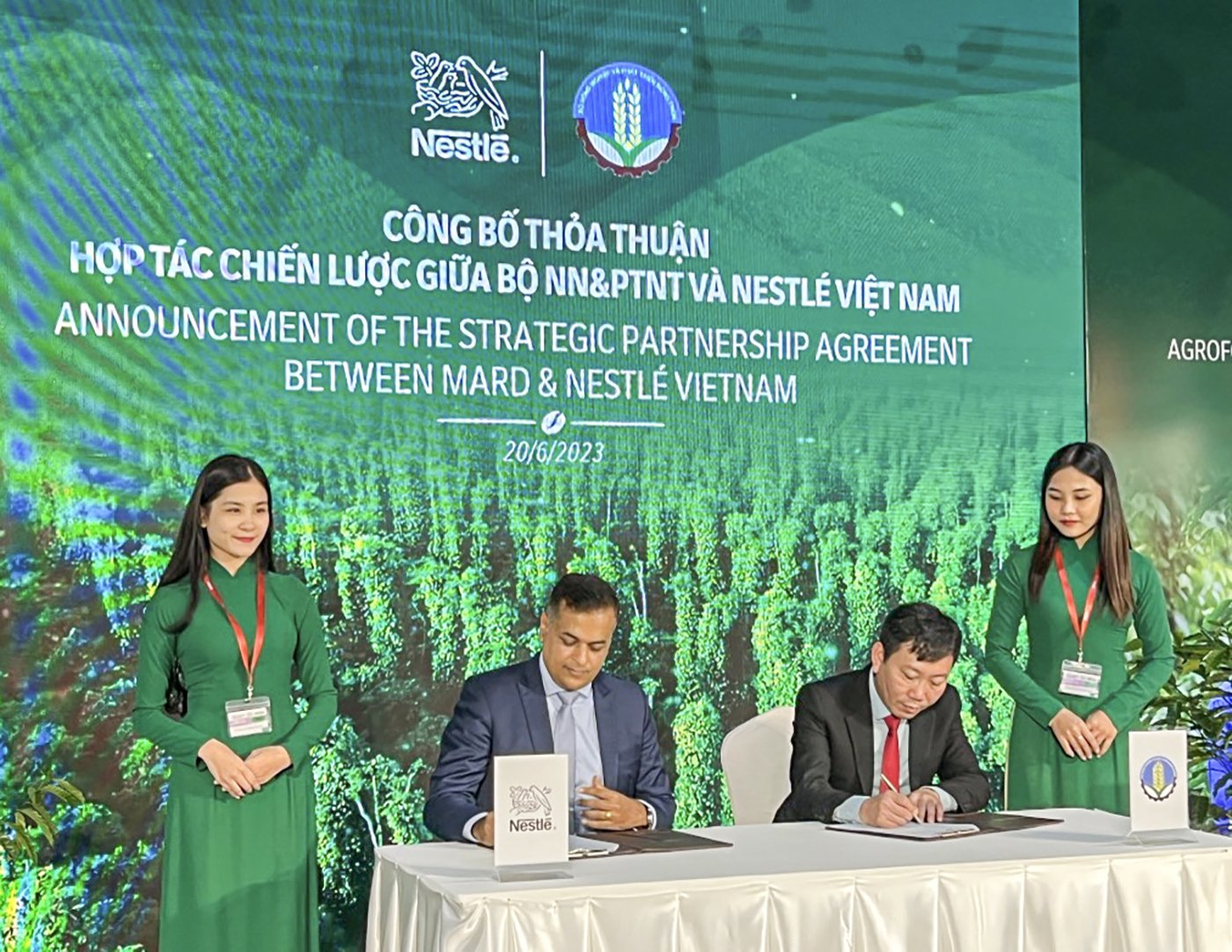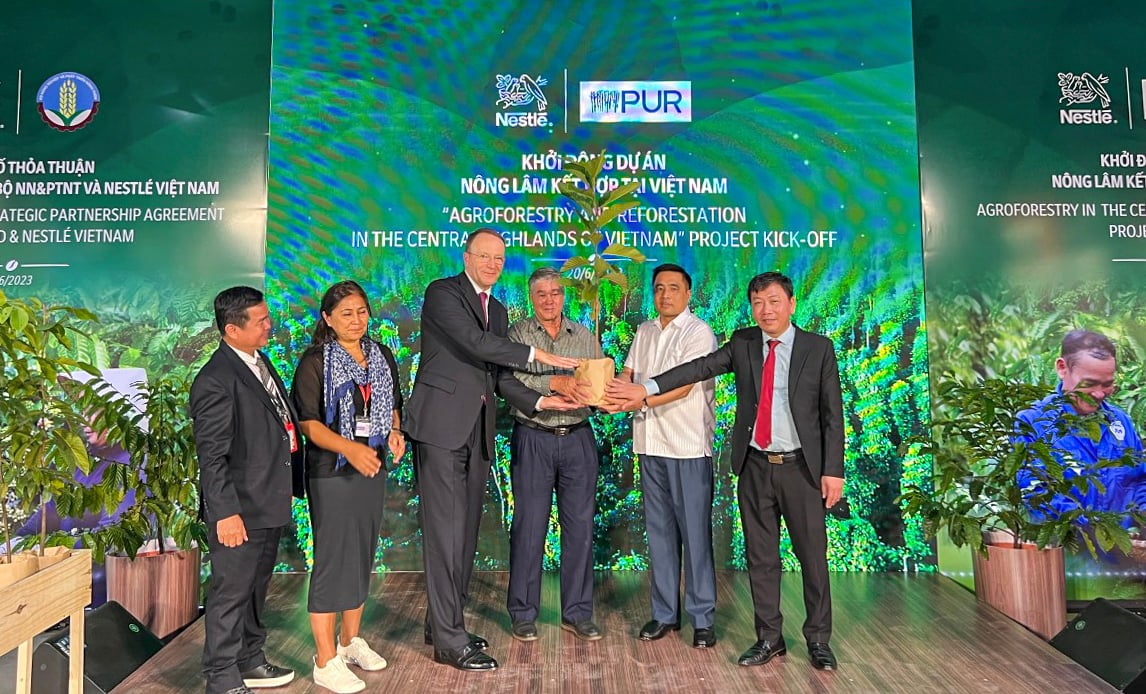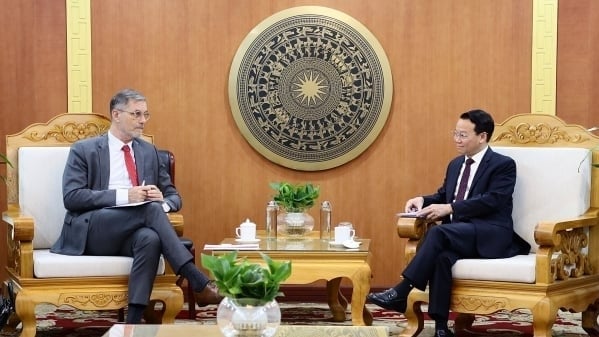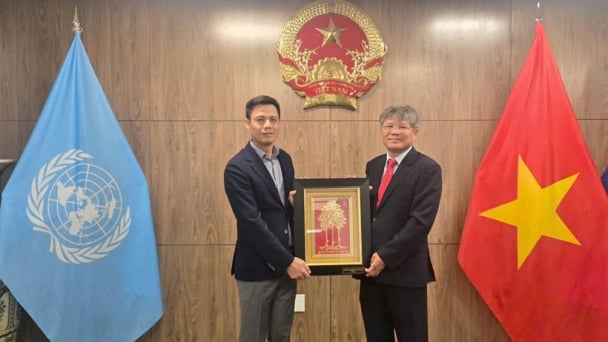May 22, 2025 | 06:38 GMT +7
May 22, 2025 | 06:38 GMT +7
Hotline: 0913.378.918
May 22, 2025 | 06:38 GMT +7
Hotline: 0913.378.918

Mr. Nguyen Do Anh Tuan, Director General of the International Cooperation Department - MARD (right) and Mr. Binu Jacob, General Director of Nestlé Vietnam (left) signed a Memorandum of Cooperation between Nestlé Vietnam and the Ministry of Agriculture and Rural Development.
On June 20, within the framework of the Partnership for Sustainable Agriculture in Vietnam (PSAV), Nestlé Vietnam Co., Ltd. and the Ministry of Agriculture and Rural Development (MARD) signed a Memorandum of Understanding (MOU) on strengthening public-private cooperation toward sustainable, regenerative, and low-emission agriculture. MARD leaders met and worked with Mr. Mark Schneider, CEO of Nestlé.
The MOU recognizes Nestlé Vietnam as an active member of PSAV for strengthening the public-private partnership. The enterprise has connected research institutes and local authorities in implementing projects to increase the value of supply chains and agricultural products, promote regenerative agriculture, contribute to net zero emissions, and improve the farmers’ well-being.
Furthermore, in the meeting, MARD Deputy Minister Nguyen Quoc Tri and Nestlé Director Mark Schneider officially launched the project “Agroforestry and Reforestation in the Central Highlands of Vietnam.” The project aims to plant at least 2.3 million trees (wooden trees, fruit trees, etc.) in four Central Highlands provinces, helping to remove about 480,000 tons of CO2 emission in the five-year period (2023-2027). This model not only brings economic benefits to local farmers and Vietnam’s coffee industry, but also protects the ecosystem, restores the land, decreases climate change, and moves towards green, sustainable agriculture development.
With the European Union’s Deforestation-free Regulation (EUDR) coming into force in December 2024, the partnership between MARD and Nestlé Vietnam is significant. The public-private cooperation is a positive sign for Vietnam’s coffee exports, reinforcing the image of sustainable and environmentally friendly agricultural products.
In that context, Vietnam Agriculture Newspaper interviewed Mr. Nguyen Do Anh Tuan, Director General of the International Cooperation Department – MARD – to clarify future opportunities for which the MOU with Nestlé Vietnam is a critical premise.

Mr. Mark Schneider, CEO of Nestlé Global (3rd from the left), kicks off the Agroforestry and Reforestation in the Central Highlands of Vietnam.
Could you tell us about the significance of Nestlé Vietnam – a leading food and beverage company – signing the MOU on sustainable agricultural development and supporting the implementation of agroforestry projects, aiming to grow 2.3 million trees in the Central Highlands?
The MOU between MARD and Nestlé Vietnam Co., Ltd on sustainable, regenerative, and low-emission agriculture will promote Public Private Partnership (PPP), supporting the Vietnamese government’s commitment to achieving net zero emissions by 2050. At the same time, the MOU strengthens information exchange regarding regenerative agricultural practices towards low-emission agriculture in response to climate change; promotes technology transfer and digital transformation through research; communicates and raises awareness among multiple stakeholders.
With Nestlé’s Agroforestry and Reforestation in the Central Highlands of Vietnam project, Western Highlands Agriculture & Forestry Science Institute (WASI) and Tay Nguyen University will join as implementation stakeholders. By growing about 2.3 million trees in four provinces of the Central Highlands (Dak Lak, Lam Dong, Gia Lai and Dak Nong), the project will contribute to the progress of Vietnam’s 1 billion tree planting program. The project deploys pilot planting of forest and fruit trees on coffee fields, following a model of agroforestry/intercropping. The project is expected to improve economic value, farmers’ income, and coffee farming conditions; especially resisting pests and natural disasters caused by climate change (drought, storm, etc.) to restore the land. The project also supports ecological, low-emission, and sustainable agricultural development.
Are there many local enterprises in Vietnam interested in forestation like Nestlé?
Nestlé’s initiative has inspired and motivated many others – including local and international enterprises in the coffee industry – to adopt inclusive and sustainable management. Some Vietnamese enterprises, Vinh Hiep for example, are developing organic coffee products to reach demanding markets. Besides, enterprises in other industries are also developing methodologies and core values, meeting international standards not only in quality but also factors of production and sustainability.
As the EU will soon implement EUDR, how Nestlé’s commitment to sustainable agricultural development may influence the private sector to take action?
As the EU will soon implement EUDR, Nestlé’s participation in sustainable agriculture via public-private partnerships and agroforestry projects will further promote green development and farmers’ livelihood while adapting to EU regulation. It not only protects but also expands and regenerates the existing forest area. In technical terms, these are nature-based and nature-positive approaches. Nestlé’s success will influence local enterprises to prevent deforestation and combat forest degradation through conservation, restoration, forest management, and value chains, altogether improving the environment.
Nestlé has shown its social responsibility to the farmers’ livelihoods as well as Vietnam’s environment. From the government’s perspective, what plan does MARD provide to local and international enterprises as they respond to environmental issues by fostering public-private partnerships?
The public-private partnership between Nestlé and PSAV demonstrates effective cooperation to develop ecological, low-emission, and sustainable agriculture. It also shows the enterprise’s social responsibility besides production and investment. MARD (via PSAV) will facilitate conversation to remove barriers and create the most favorable policy system for local and international enterprises to invest in public-private partnerships. We connect with local farmers to develop green, low-emission, and sustainable agriculture, thereby enhancing Vietnam’s position in the global agriculture market.
Regenerative agriculture is a farming approach in which agricultural production actively improves soil quality and fertility as well as protects water resources and biodiversity. Improving soil quality helps to increase the land’s ability to absorb CO2 and create biomass fuel from plants. Better soil quality will increase resilience to the effects of climate change, increase productivity, and improve farmers’ incomes and livelihoods.
Translated by Quynh Chi

(VAN) On May 21, Minister of Agriculture and Environment Do Duc Duy worked with Mr. Olivier Brochet, Ambassador Extraordinary and Plenipotentiary of the French Republic to Vietnam.

(VAN) VRG recently conducted a visit and working trip to the United States to demonstrate its efforts in redefining the role of rubber enterprises in the global value chain.

(VAN) In 2024, over 295 million people across 53 countries and territories faced acute hunger—an increase of almost 14 million people compared to 2023, while the number of people facing catastrophic levels of hunger reached a record high.

(VAN) World Environment Day 2025 (June 5) carries the theme 'Beat Plastic Pollution' continuing to emphasize the global urgency of addressing the plastic waste crisis.

(VAN) This was the assessment shared by experts at the workshop titled 'Assessing the Role and Potential of Low-Emission Rice Production Systems in Vietnam,' held on the morning of May 19.

(VAN) Cai Rong Port is the fisheries control center of Quang Ninh, helping to monitor fishing vessels, combat IUU fishing, and remove the EC's 'yellow card'.

(VAN) The German Agricultural Society (DLG) explores the possibility of establishing a mechanization service center in Vietnam’s Mekong Delta to support farmers in accessing and utilizing advanced machinery.